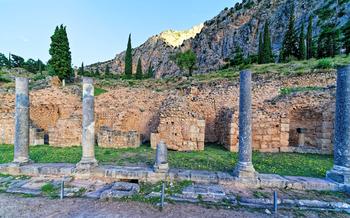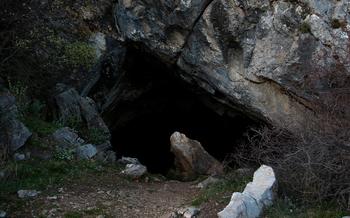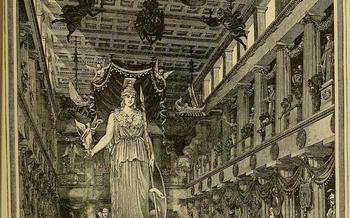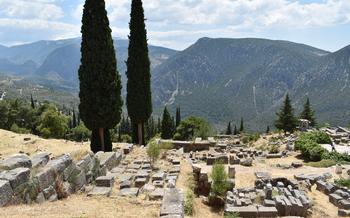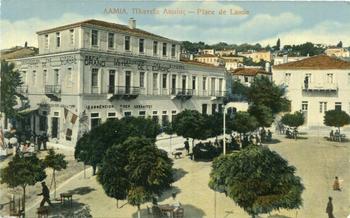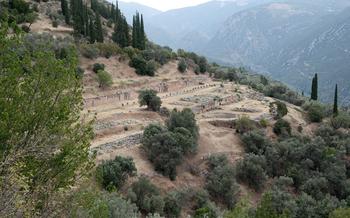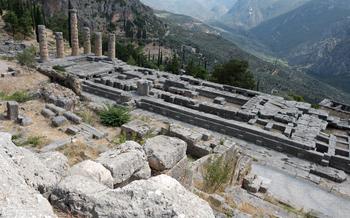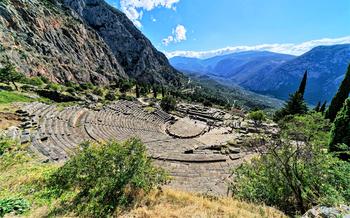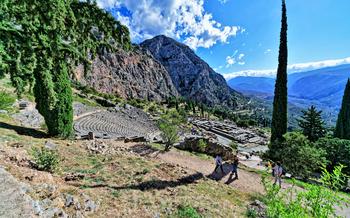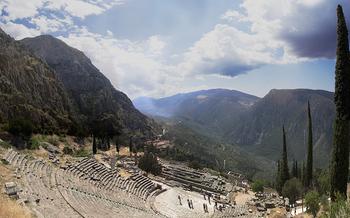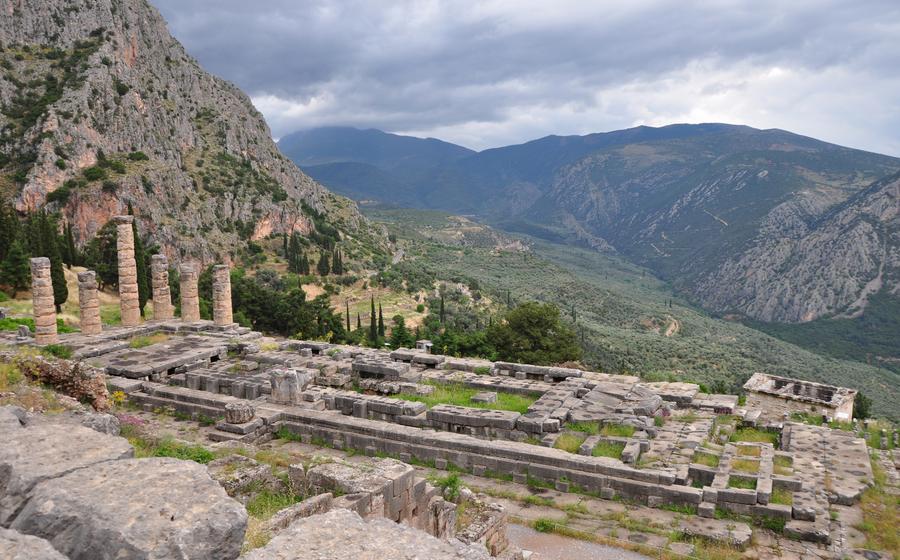
The Folklore Museum of Itea
- The Folklore Museum of Itea: A Hidden Gem
- Exploring the Museum's Exhibits: A Journey Through Time
- The Art of Weaving: A Showcase of Skill and Creativity
- The Olive Press: A Symbol of Greek Agriculture
- The Folklore Museum's Educational Programs
- The Folklore Museum's Contribution to Preserving Cultural Identity
- Itea: A Charming Town with a Maritime Heritage
- Must-See Landmarks in Itea
- Local Delicacies to Try in Itea
- Day Trips from Itea
- Festivals and Events in Itea: A Celebration of Culture and Tradition
- Practical Tips for Visiting the Folklore Museum of Itea
- Insider Tip: Hidden Gems to Discover
The Folklore Museum of Itea: A Hidden Gem
Nestled in the picturesque town of Itea, on the shores of the Gulf of Corinth, lies a treasure trove of Greek folk culture and heritage. The Folklore Museum of Itea is a hidden gem that provides visitors with a unique glimpse into the everyday life and traditions of the region. This charming museum houses a diverse collection of artifacts that showcase the rich cultural heritage of Greece.
From traditional costumes and textiles to agricultural tools and household objects, the museum offers a fascinating journey through time. Visitors can explore intricate woven textiles, admire handcrafted pottery, and gain insights into the customs and beliefs that have shaped the local community for generations. The Folklore Museum of Itea is a must-visit destination for anyone interested in discovering the true essence of Greek culture.
Exploring the Museum's Exhibits: A Journey Through Time
The Folklore Museum of Itea houses a diverse collection of artifacts that provide a glimpse into the rich cultural heritage of Greece. Traditional costumes and textiles, agricultural tools and implements, household objects and furniture, and handicrafts and souvenirs are just a few of the treasures that await visitors.
The museum's collection of traditional costumes and textiles is particularly impressive, showcasing the intricate embroidery, vibrant colors, and unique styles that characterize Greek folk attire. Visitors can admire beautifully preserved garments, including wedding dresses, festive outfits, and everyday clothing, each telling a story of the region's customs and traditions.
Agricultural tools and implements offer insight into the agricultural practices and rural lifestyle that have shaped Greek culture. From simple hand tools to more complex machinery, these artifacts demonstrate the ingenuity and resourcefulness of the Greek people in cultivating their land.
Household objects and furniture provide a glimpse into the domestic life of past generations. Visitors can see traditional cooking utensils, pottery, and furniture, as well as items related to child-rearing and daily chores. These artifacts offer a tangible connection to the everyday lives of the people who lived in this region.
Handicrafts and souvenirs, such as woven baskets, embroidered textiles, and pottery, showcase the artistic skills and creativity of local artisans. These items not only serve as decorative objects but also represent the vibrant folk art traditions of Greece.
The Art of Weaving: A Showcase of Skill and Creativity
Weaving has been an integral part of Greek culture for centuries, with each region boasting its unique techniques and styles. The Folklore Museum of Itea proudly showcases this rich heritage through a stunning display of intricately woven textiles and garments. Visitors can marvel at the intricate patterns, vibrant colors, and masterful craftsmanship that go into each piece.
The museum's collection includes a wide variety of woven items, from traditional costumes and blankets to decorative rugs and tapestries. Each piece tells a story of the region's history, traditions, and artistic sensibilities. Visitors can trace the evolution of weaving techniques over time, from simple hand-spun yarns to complex patterns created using multiple looms.
The museum also hosts workshops and demonstrations, where visitors can learn firsthand about the art of weaving. Skilled artisans demonstrate the traditional methods of spinning, dyeing, and weaving, using natural materials such as wool, cotton, and silk. Visitors can try their hand at weaving on a simple loom, creating their own unique souvenir to take home.
The Olive Press: A Symbol of Greek Agriculture
In the heart of the museum, one exhibit stands out as a testament to Greece's rich agricultural heritage: the traditional olive press. Greece is renowned for its olive cultivation, and the museum offers a fascinating glimpse into the methods and tools used to produce the country's liquid gold.
Olive oil holds a special place in Greek cuisine and culture. It's an essential ingredient in many traditional dishes, adding flavor and health benefits to every meal. The museum's display showcases the traditional olive press, a device that has been used for centuries to extract oil from olives.
Visitors can marvel at the ingenuity of the design, which relies on simple mechanisms to achieve a complex task. The press consists of a large stone basin, a heavy stone wheel, and a screw mechanism. Olives are placed in the basin and crushed by the rotating wheel, releasing their precious oil.
The museum's exhibit not only provides insights into the history and technology of olive oil production but also highlights its cultural significance. Olive trees have been cultivated in Greece for millennia, and the production of olive oil has been an integral part of Greek agriculture and economy for centuries.
Through interactive displays and demonstrations, the museum educates visitors about the different stages of olive oil production, from harvesting and crushing the olives to extracting and storing the oil. Visitors can learn about the importance of olive oil in Greek gastronomy and its use in traditional recipes and remedies.
The olive press exhibit is a reminder of the deep connection between Greece and its agricultural heritage. It's a tribute to the hard work and dedication of generations of Greek farmers who have cultivated olive trees and produced olive oil, shaping the country's culinary and cultural identity.
The Folklore Museum's Educational Programs
The Folklore Museum of Itea goes beyond showcasing artifacts; it actively engages visitors in the rich cultural traditions of Greece. Through a series of educational programs, workshops, and interactive exhibits, the museum provides a platform for learning and appreciation of intangible cultural heritage.
Workshops and Demonstrations: The museum organizes hands-on workshops and demonstrations that allow visitors to experience traditional crafts and skills firsthand. From weaving and pottery to cooking and dancing, these workshops provide a unique opportunity to learn from local artisans and craftspeople.
Educational Programs for School Groups and Families: The museum offers tailored educational programs for school groups and families, designed to spark curiosity and foster cultural understanding. These programs include guided tours, interactive activities, and storytelling sessions that bring the museum's exhibits to life.
Interactive Exhibits for Children: The museum recognizes the importance of engaging younger visitors. It features interactive exhibits designed specifically for children, allowing them to explore Greek culture through play and hands-on activities. These exhibits encourage creativity, curiosity, and a lifelong appreciation for heritage.
Promotion of Cultural Heritage and Appreciation: Through its educational initiatives, the Folklore Museum of Itea plays a crucial role in promoting cultural heritage and appreciation. By actively engaging visitors of all ages, the museum fosters a sense of connection to the past and a deeper understanding of the diverse cultural traditions of Greece.
The Folklore Museum's Contribution to Preserving Cultural Identity
The Folklore Museum of Itea is not merely a repository of artifacts; it is an active guardian of Greece's intangible cultural heritage. It plays a pivotal role in safeguarding and promoting traditional practices that are at risk of disappearing in the face of modernization. The museum's dedicated staff works tirelessly to document and preserve these practices, ensuring that future generations can appreciate and learn from the wisdom of their ancestors.
Through workshops, demonstrations, and educational programs, the museum provides a platform for local artisans and craftspeople to showcase their skills and pass on their knowledge to younger generations. These initiatives not only sustain traditional livelihoods but also foster a sense of cultural pride and continuity. The museum's efforts extend beyond its walls, as it collaborates with local communities to organize festivals and events that celebrate traditional customs and folklore.
The Folklore Museum of Itea stands as a testament to the enduring power of cultural heritage. It is a place where the past and present converge, where visitors can gain a deeper understanding of Greek culture and traditions while contributing to their preservation. By supporting the museum's mission, visitors become part of a collective effort to ensure that Greece's rich cultural tapestry remains vibrant and alive for generations to come.
Itea: A Charming Town with a Maritime Heritage
Itea, a picturesque town nestled on the Gulf of Corinth, welcomes visitors with its rich maritime heritage and captivating charm. As a former port town, Itea played a crucial role in trade and commerce, leaving behind a legacy that is still visible today. The harbor, with its colorful fishing boats and traditional caiques, exudes an authentic ambiance, inviting visitors to explore the town's maritime roots.
Strolling along the waterfront promenade, one can admire the panoramic views of the gulf, dotted with small islands and surrounded by lush greenery. The promenade is a popular spot for locals and tourists alike, offering a relaxing atmosphere to soak in the beauty of the surroundings. Take a leisurely walk, enjoy a refreshing drink at one of the waterfront cafés, or simply sit on a bench and watch the world go by.
Must-See Landmarks in Itea
Itea may be a small town, but it packs a punch when it comes to landmarks. The Church of Agios Nikolaos, with its iconic blue dome and intricate frescoes, is a testament to the town's religious heritage. The Clock Tower, a symbol of Itea's maritime history, offers panoramic views of the town and the surrounding mountains. The Naval Museum delves into the town's seafaring past, showcasing exhibits on local naval battles and traditions. And the Municipal Market, a bustling hub of activity, is the perfect place to sample local produce, traditional crafts, and delicious street food.
Local Delicacies to Try in Itea
Itea's culinary scene is a delightful blend of fresh seafood and traditional Greek flavors. Start your day with a visit to the vibrant municipal market, where you can browse stalls overflowing with colorful fruits, vegetables, and freshly caught fish. Indulge in a leisurely lunch at one of the traditional tavernas lining the picturesque harbor, savoring dishes like grilled octopus, succulent shrimp, or aromatic moussaka. Don't miss the opportunity to sample the local specialty, sardines, prepared in various mouthwatering ways. For a sweet treat, head to one of the charming cafés and indulge in traditional pastries like baklava and loukoumades, or savor a refreshing scoop of homemade ice cream while enjoying the stunning sea views. Itea's culinary delights are the perfect complement to your cultural exploration, offering a taste of the region's rich heritage.
Day Trips from Itea
Itea serves as an excellent base for exploring the surrounding region, offering a range of captivating day trip options. One of the most popular destinations is the picturesque island of Galaxidi, a short boat trip from Itea. With its charming harbor, colorful houses, and narrow streets, Galaxidi exudes a unique charm. Visitors can enjoy a leisurely stroll along the waterfront, visit the local museums, or indulge in fresh seafood dishes at one of the many tavernas.
For those interested in history, a visit to the ancient city of Nafpaktos, located on the opposite side of the Gulf of Corinth, is a must. This captivating city boasts a rich past, having been ruled by various civilizations throughout history. Visitors can explore the well-preserved Venetian fortress, wander through the atmospheric old town, and learn about the region's fascinating history at the local museum.
For those seeking natural beauty, the Peloponnese peninsula, which lies just a short drive from Itea, offers a plethora of stunning landscapes. From the lush forests and waterfalls of the mountainous interior to the pristine beaches and crystal-clear waters of the coastline, the Peloponnese is a paradise for nature lovers. Visitors can embark on scenic hikes, explore traditional villages, or simply relax and enjoy the breathtaking scenery.
No matter your interests, Itea provides an abundance of opportunities for exciting day trips. Whether you seek history, culture, or natural beauty, the surrounding region has something to offer every traveler.
Festivals and Events in Itea: A Celebration of Culture and Tradition
Itea comes alive during its vibrant festivals and events, offering visitors a chance to immerse themselves in the region's rich cultural heritage. The Itea Summer Festival is a highlight of the town's cultural calendar, showcasing a diverse program of music, theater, and the arts. Held in the picturesque setting of the harbor, the festival features performances by renowned Greek and international artists, creating a magical atmosphere under the summer sky.
The Sardine Festival is a culinary extravaganza that celebrates the town's fishing heritage. Held annually in August, the festival attracts visitors from all over Greece and beyond to savor delicious sardine dishes prepared in various traditional ways. The festival is a feast for the senses, with the air filled with the aroma of grilled sardines and the lively sounds of traditional Greek music.
The Itea Carnival is a colorful and lively event that takes place during the pre-Lenten period. The town transforms into a kaleidoscope of colors as locals and visitors alike don elaborate costumes and masks to participate in parades and festivities. The carnival is a celebration of joy, laughter, and the spirit of community, providing a glimpse into the playful side of Greek culture.
These festivals and events offer a unique opportunity to experience the vibrant cultural traditions of Itea and the surrounding region. Whether you're a music lover, a foodie, or simply seeking a glimpse into local customs, there's something for everyone to enjoy. Embrace the festive spirit of Itea and immerse yourself in the celebrations that showcase the town's rich heritage and warm hospitality.
Practical Tips for Visiting the Folklore Museum of Itea
Visiting Hours and Admission Fees: The Folklore Museum of Itea is open to the public from Tuesday to Sunday, with specific hours depending on the season. Admission fees are minimal, and reduced rates are available for students and seniors. It is advisable to check the museum's website or contact them directly for the most up-to-date information.
Guided Tours: For a more in-depth experience, guided tours of the museum are available upon request. These tours are led by knowledgeable staff who can provide insights into the exhibits and their cultural significance. Guided tours are especially recommended for groups or those who want a deeper understanding of the museum's collection.
Allow Ample Time: Exploring the Folklore Museum of Itea is a leisurely and immersive experience. Set aside at least an hour to fully appreciate the exhibits and take in the wealth of information on display. The museum's tranquil atmosphere encourages visitors to slow down, appreciate the details, and delve into the fascinating world of Greek folk culture.
Combine with a Stroll: The Folklore Museum of Itea is situated within walking distance of the town's picturesque harbor and waterfront promenade. After your visit, take some time to stroll through the charming streets of Itea, admire the colorful buildings, and soak up the laid-back atmosphere. It's the perfect way to complement your cultural experience with a delightful exploration of the town.
Insider Tip: Hidden Gems to Discover
While visiting the Folklore Museum of Itea, take the opportunity to explore the surrounding area and uncover hidden gems that will enrich your experience. Just a short drive away is the picturesque village of Chryso, where you can wander through narrow cobblestone streets and admire traditional Greek architecture.
For a touch of mythology, visit the Cave of Pan, believed to be the birthplace of the Greek god Pan. Immerse yourself in the legends and myths of ancient Greece as you explore the cave's mysterious chambers.
If you're feeling adventurous, embark on a hike to the summit of Mount Parnassus, the legendary home of the Muses. The breathtaking views from the top will reward your efforts and offer a unique perspective of the region.
Venture beyond the museum and discover the hidden treasures of the region. Explore nearby villages, immerse yourself in local traditions, and uncover the secrets that make this corner of Greece so special.
